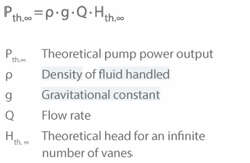Slip
Slip plays an important role in calculating the radial or mixed flow impeller of a centrifugal pump, with which a specific head (H) is to be generated for the flow rate (Q). If the vanes of the impeller were infinite in number (∞) and infinitely thin, pump power output (Pth.∞) would be theoretically (th) calculated as follows in the presence of an ideal (friction-free) liquid:

An ideal fluid and infinite number of vanes lead to a vane-congruent flow, i.e. a flow that follows the vane contours in the impeller, and yield the theoretical head (Hth.∞) as per EULER's fundamental equation (see Fluid mechanics). A finite number of vanes (z), however, leads to a deviation in the flow direction of the impeller from the vane contours. The mean angle of the relative velocity at the impeller outlet in particular is smaller than the vane outlet angle for a finite number of vanes (z). This deviation, which increases as the number of vanes (z) decreases, means that the theoretical head (Hth), and thus the theoretical pump power output (Pth) (for identical flow rate and density), are smaller if the number of vanes is not infinite:

The result is a difference in power for the slip (ΔPth.) which equals approximately 25 to 60 percent of pump power output for conventional radial impellers. Slip can be expressed mathematically as follows:

Slip is not synonymous with a loss in power, since it is based on the assumption of a friction-free fluid flow at the impeller.
The ratio of Hth.∞ to Hth is expressed by the slip factor (1 + p), which empirically references the influence of the number of vanes, impeller geometry, impeller diameter, vane angle at the outlet, and diffuser element behind the impeller.
The correlation between heads H and Hth is determined by the hydraulic efficiency (ηh).

Calculating an impeller based on the slip theory requires a great deal of experience and primarily involves numerical arithmetic techniques (see CFD). Axial impellers are calculated based on the aerofoil theory, which also utilises numerical flow calculation methods.
